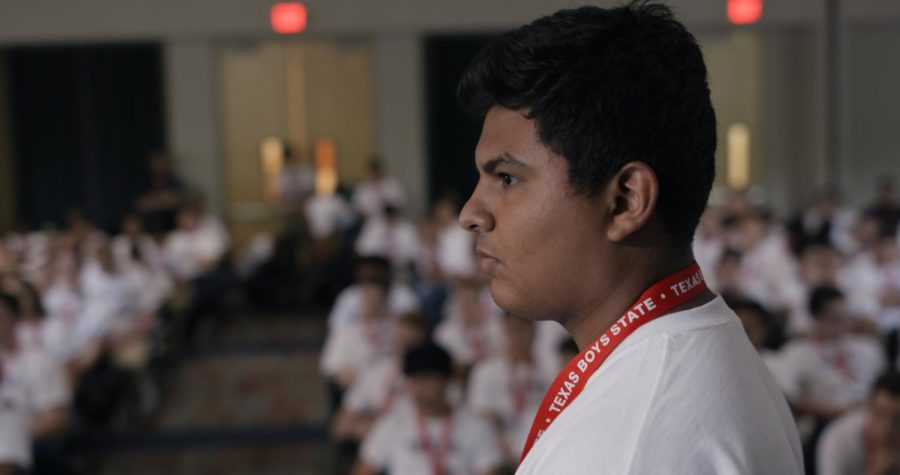‘Boys State’ Embraces Modern Politics and Creates Bridges to Bipartisanship
October 19, 2020
In George Washington’s Farewell Address in 1796, he warned about the dangers of the existence of political parties. Washington said, “[Political] parties are likely to become potent engines by which cunning, ambitious, and unprincipled men will be enabled to subvert the power of the people and to usurp for themselves the reins of government.”
The documentary “Boys State” opens with this quote, and the film follows four young men as they participate in a program by the same name in Texas. The program, Boys State, is designed to allow boys to learn about government, democracy and civic engagement through participation in a mock election. The 1,100 participants are randomly assigned to one of two parties, the Nationalist Party or the Federalist Party. The Boys State program, which was founded in 1935 — a Girls State was subsequently added in 1937 — has featured notable alumni and career politicians throughout its lifetime. Cory Booker, Bill Clinton, Rush Limbaugh and Bruce Springsteen are just a few examples of the famed figures who have participated in Boys State.
The film, directed and produced by Jesse Moss and Amanda McBaine, takes a fly on the wall approach to vérité filmmaking. As the film progresses and events of the weeklong program unfold, the audience feels as though they are also attending Boys State. The film focuses on four standout participants in the 2018 Boys State program — we meet “politics junkie” Ben Feinstein, the earnest and down-to-earth Steven Garza, the passionate outsider René Otero and the charming but conforming Robert MacDougall. Together, this ensemble — split between the two parties — explores the system of a gubernatorial election. Each party must elect a party chair and a candidate for governor, but at the end of the program, only one candidate can be elected governor.
The Electoral Process
Each party must decide what policies they will stand for and how they will navigate the campaign system. As the campaigns for party chair and gubernatorial candidates progress, themes of toxic masculinity, sexism and racism emerge. At times, the groups of boys appear to devolve into cult-like subsets that eerily reflect themes apparent in the 1954 novel “Lord of the Flies.” In both parties, abortion is identified as one of the top issues — but the reality is that these groups of boys who most likely have received an incomplete sex education are attempting to make decisions about women’s bodies with no women present. The candidates who decide to run for party chair and governor utilize a cult of personality in their speeches as they attempt to persuade their peers to vote in certain ways.
The microcosm of the political system within Boys State is terrifying. These subjects of the documentary do not hide the fact that their sole ambition is to win the election. Racist attacks are shared on social media. Political power is seen as more valuable than moral behavior. But, at the same time, hope remains. The boys are encouraged to listen to one another, to find common ground and to make compromises. With over a thousand attendees from all different backgrounds, being able to agree or find a solution that satisfies both parties appears near impossible. However, by listening and respectfully discussing policies, the subjects of “Boys State” were able to create real progress. While the discussions of policy may have begun with a debate over pineapple on pizza, the Boys State attendees found a way to compromise and discuss powerful topics. In their mock government, the boys decided to pass universal background checks for gun purchases — an act of legislation that had never before happened in Boys State history.
Hope for the Future?
The boys participating in this program reflect the current state of politics — after all, their behavior is learned from the politicians and governmental processes happening today. In a press conference, director and producer Amanda McBaine shared, “It’s not about who we elect but also how we elect that matters.” In this program, politics have been gamified — but real lives are on the line outside of Boys State.
After running a campaign for governor, Steven Garza said, “It’s all about appealing to people’s better selves, and our generation is not too focused on party affiliation but rather on what policies are being proposed. Can we put aside labels and sit down with some sort of agreement? I think I was able to do it at Boys State and wish more politicians around the country would sit down with their opposition and go home knowing they did something good for the American people.”
Garza’s campaign for governor began as he asked the members of his party what traits and policies were important to them. By appealing to his party and “people’s better selves,” Garza made a conscientious effort to bridge our modern polarization. Garza’s argument about forgetting party labels and focusing on people and the issues that are important to them stuck with me long after the documentary’s credits ran. At Boys State, in order to win the governor’s election, you must receive votes from both parties.
The documentary inspires reflection and inquiry into our own political systems. Why aren’t we making an effort to be more bipartisan? Why don’t politicians listen to the people they oppose? Is it possible to make a more perfect union?
In an election year, “Boys State” is a must-watch. Its discussions of politics and the systems in place are necessary to have, and it leaves the viewer with a sense of hope for the future — these subjects of the documentary may go on to become politicians, and I hope that they are able to utilize the listening skills and effective compromises that defined their progress at Boys State. More so, the documentary encourages young people to get involved and engaged with politics — in voting, protesting and other means — which is especially timely and imperative for this year’s ever-looming election.
“Boys State” debuted on Jan. 24, 2020 at the Sundance Film Festival where it won the U.S. Documentary Competition Grand Jury Prize.
“Boys State” is an Apple Original Films and A24 Release. Now available to stream on Apple TV+.








